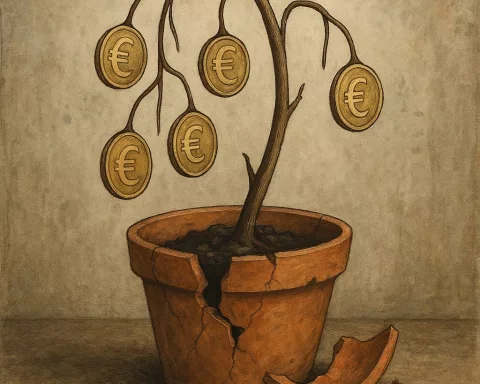Cyril Ramaphosa, the President of South Africa, has boldly declared that his party, the African National Congress (ANC), will not let businesses dictate government decisions. He insists that all choices will be made for the people, not for wealthy business leaders. This strong statement comes after business figures expressed worries about political tensions, especially concerning a coalition government. Ramaphosa’s commitment to the people’s needs shows the ANC’s dedication to democratic values, promising to stand firm amid challenges and ensure the government serves its citizens first. As the ANC navigates these tough times, eyes are on them to see how they uphold their promises.
What is Cyril Ramaphosa’s stance on business influence in government decisions?
Cyril Ramaphosa asserts that the African National Congress (ANC) will not be swayed by business pressures. He emphasizes that decisions will be guided by the needs of the electorate, not external business interests, reaffirming the ANC’s commitment to democratic principles and the welfare of South Africans.
A Bold Declaration
President Cyril Ramaphosa’s assertive proclamation that neither the African National Congress (ANC) nor the South African government will bow to business pressures regarding the future of the Government of National Unity (GNU) marks a watershed moment in the country’s political landscape. This firm stance follows a letter from prominent business figures urging for the maintenance of the coalition, particularly after recent tensions with the Democratic Alliance (DA).
Ramaphosa’s position is a reaffirmation of the ANC’s foundational principles, especially in an era where economic and political interests often intersect. The letter, authored by influential leaders such as Discovery CEO Adrian Gore and Anglo American chief Duncan Wanblad, highlights the business community’s apprehensions about the potential disintegration of the GNU. They warned of grave repercussions, including job losses and economic setbacks, if the coalition were to collapse over a national budget dispute. The missive stressed the importance of stability and advocated for sustained collaboration and compromise: “We have a great deal to lose. A collapse of the Government of National Unity could reverse the gains we have achieved.”
Speaking to journalists in Klipspruit West, Soweto, Ramaphosa acknowledged the letter but maintained a resolute position. “Business does not dictate what happens in government, in the ANC I lead. We take our own decisions based on our considerations of everything that will advance the interests of our people,” he asserted. Ramaphosa reiterated that the ANC’s decisions are guided by the mandate given to them by the electorate, not by external influences. “I want to make it clear the ANC will not be influenced by what business says. We are principally influenced by what our people say,” he concluded.
Historical Echoes and Democratic Values
This unwavering stance underscores a significant narrative in South Africa’s democratic journey. The ANC, with deep roots in its liberation struggle, has traditionally positioned itself as the voice of the people. Ramaphosa’s declaration echoes this historical sentiment. He emphasized that the pressures facing the ANC emanate from the populace, highlighting issues such as poverty, inequality, and unemployment as the real catalysts for the party’s policies and decisions, not the concerns of wealthy business figures.
Reflecting on South Africa’s political history, parallels can be drawn with past moments of tension and resilience. The formation of the GNU was itself a remarkable achievement, symbolizing compromise and unity in the post-apartheid era. Under Nelson Mandela’s leadership, the nation prioritized reconciliation and nation-building over divisive interests. Ramaphosa’s current stance aligns with this legacy, reinforcing that the ANC remains committed to serving the people rather than the elite.
The backdrop to this political drama involves a significant budget passed by the ANC without the DA’s support, including a proposed Value Added Tax (VAT) increase. The DA opposed this measure, citing concerns for low-income citizens. This budget disagreement has strained relations within the GNU, leading to public disputes and uncertainty about the coalition’s stability. The ANC’s National Executive Committee (NEC) will now deliberate on the path forward, a crucial step in addressing the coalition’s challenges.
The Intersection of Business and Politics
The influence of business on government decisions is a contentious topic in political discourse. Historical and artistic movements have frequently depicted the delicate balance between power, politics, and economic interests. For instance, during the Industrial Revolution, the rise of a capitalist class significantly influenced political decisions, often to the detriment of the working class. In modern times, the relationship between government and business remains a subject of scrutiny and debate.
Ramaphosa’s stance serves as a reminder of the ANC’s resilience and adaptability. The party has weathered numerous storms since its inception, from the days of underground resistance to becoming the ruling party in a democratic South Africa. The current challenges, though significant, are another test of the ANC’s commitment to its principles and its ability to navigate complex political landscapes.
The reaction from business leaders underscores the interconnectedness of political stability and economic prosperity. They urged both the ANC and DA to prioritize national interests and find common ground. Despite these appeals, Ramaphosa remains steadfast that the ANC’s course will be determined internally. This internal deliberation, guided by the NEC, is crucial for charting a way forward amidst the current challenges.
Reaffirmation of Democratic Principles
In the broader context, Ramaphosa’s declaration can be seen as a reaffirmation of democratic values. By emphasizing that the ANC will not be swayed by business interests, he reinforces the principle that government should be accountable to the people. This principle underpins democratic governance, ensuring that elected officials remain true to the mandate given to them by the electorate.
The complexities of coalition politics in South Africa mirror broader global trends where political alliances and disagreements can significantly impact governance and policy implementation. The GNU, a product of compromise and collaboration, represents an important experiment in coalition governance. The current challenges it faces highlight the delicate balance required to maintain such alliances.
As the NEC convenes to address these challenges, the outcome will be closely watched by all stakeholders, including the business community, political analysts, and the general public. The ANC’s ability to navigate this crisis will not only impact its political future but also the broader trajectory of South Africa’s democratic journey.
In conclusion, President Cyril Ramaphosa’s firm stance against business influence in governmental decisions marks a significant moment in South Africa’s political narrative. It underscores the ANC’s commitment to its principles and the people it represents. As the nation watches the unfolding developments, the ANC’s resolve will be a testament to its resilience and adaptability in the face of adversity.
The ANC’s enduring commitment to democratic principles and service to the people will continue to shape South Africa’s political landscape. Ramaphosa’s declaration reinforces the importance of remaining true to the electorate’s mandate, ensuring that the government remains accountable to the citizens it serves. The ANC’s navigation through this political and economic tempest will be a critical chapter in the ongoing story of South Africa’s democracy.
“`markdown
What is Cyril Ramaphosa’s stance on business influence in government decisions?
Cyril Ramaphosa asserts that the African National Congress (ANC) will not be swayed by business pressures. He emphasizes that decisions will be guided by the needs of the electorate, not external business interests, reaffirming the ANC’s commitment to democratic principles and the welfare of South Africans.
Why did Ramaphosa make this declaration now?
Ramaphosa’s strong statement follows concerns expressed by prominent business figures about political tensions, particularly regarding the stability of the coalition government known as the Government of National Unity (GNU). These business leaders have warned of potential economic repercussions if the coalition were to collapse, emphasizing the need for collaboration and compromise.
How does Ramaphosa’s declaration reflect the ANC’s historical values?
The declaration underscores the ANC’s enduring commitment to being the voice of the people, rooted in its historical struggle for liberation. Ramaphosa’s stance emphasizes that the pressures influencing ANC policies come from the electorate, focusing on crucial issues like poverty, inequality, and unemployment rather than the concerns of wealthy business figures.
What are the implications of Ramaphosa’s stance for the Government of National Unity?
Ramaphosa’s position signals a commitment to internal decision-making within the ANC, suggesting that the party will prioritize its mandate from the electorate over external business interests. This approach may lead to further tensions within the GNU, especially as the ANC navigates complex budgetary disputes and coalition challenges.
How does business influence the political landscape in South Africa?
The relationship between business and politics in South Africa is complex and contentious. Historical trends have shown that economic interests can significantly impact political decisions. Ramaphosa’s declaration serves as a reminder of the need for political leadership that remains accountable to the electorate rather than succumbing to business pressures, reinforcing democratic governance.
What is the significance of the ANC’s upcoming National Executive Committee (NEC) meeting?
The NEC meeting is crucial for addressing the current challenges facing the ANC and the GNU. It will play a key role in determining the party’s course in light of recent tensions and budget disputes. The decisions made in this meeting will not only affect the ANC’s political future but also have broader implications for South Africa’s democratic journey and coalition governance.
“`












